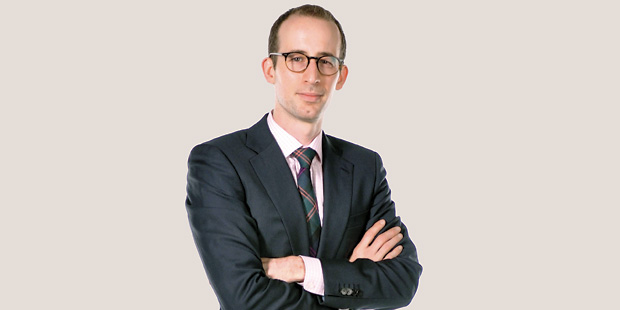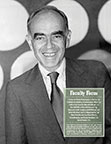Introducing Adam Cox
Professor of Law
Printer Friendly VersionIt was tough for Adam Cox to choose between practicing law and teaching it. “I knew I’d love to teach,” he recalls, “but I was a little less confident that I’d love the process of legal scholarship because I’m a social person.” The gregarious Cox decided to teach, but surmounted the “lonely academic” issue by working collaboratively with other scholars to produce a significant body of multidisciplinary research on two dinnertable topics of debate: voting rights and immigration law.
Cox will join the faculty of NYU School of Law as a tenured professor this fall. He will teach immigration law, as he did while a visiting professor in Fall 2008. He comes from the University of Chicago Law School, where he began his academic career in 2002 as a Bigelow Teaching Fellow and was most recently professor of law. University of Chicago colleague Eric Posner, who has co-authored several articles with Cox, including “The Rights of Migrants: An Optimal Contract Framework” (New York University Law Review, 2009), adds: “Professor Cox brings to bear a wide range of interdisciplinary approaches, such as economics and political science, which enable him to advance the literature in immigration law significantly.” For example, by applying economic models, the authors concluded that rather than being a problem due to insufficient enforcement resources, illegal immigration is a policy choice that allows the United States to obtain cheap labor while retaining the power to deport those who burden the justice or welfare systems and grant amnesty to those who become productive members of society.
Cox has also made significant contributions to the literature of voting rights and election law. In “Judging the Voting Rights Act” (Columbia Law Review, 2008), he and co-author Thomas Miles, an economist and law professor at the University of Chicago Law School, provided the first empirical evidence that race as well as political ideology can influence judicial decisions. Their analysis of how judges voted on lawsuits brought under the Voting Rights Act of 1965 also revealed that the political affiliation and race of the colleagues that judges sat with on panels affected their decisions.
Cox and Miles had clerked for judges on opposite ends of the political spectrum on the U.S. Court of Appeals for the Ninth Circuit. Cox worked for Judge Stephen Reinhardt, who is so renowned as an activist that The Onion once satirically reported that he had declared the private celebration of Christmas unconstitutional. Noting that their findings didn’t make them any friends on either side of the political divide, Miles praises Cox: “He is a fantastic person to collaborate with who has great academic and scholarly values and is interested in a thorough and wide-ranging inquiry.” Posner, echoing Miles, describes Cox as “by nature dispassionate rather than ideologically inclined, which allows him to understand and evaluate all points of view.”
Growing up in suburban Detroit, Cox was more interested in science than public policy. His father, an engineer, and mother, a child psychologist, own a small manufacturing company, and Cox entered Princeton University on the techie track, graduating summa cum laude in 1996 with a degree in mechanical and aerospace engineering. (Miles adds that Cox is still mechanically adept, having fixed his iPhone recently.) Cox won a full-tuition merit scholarship to the University of Michigan Law School, eventually graduating first in his class.
After his clerkship in Los Angeles, Cox moved to New York City, where he spent a year as Karpatkin Civil Rights Fellow at the American Civil Liberties Union Foundation. Before beginning his academic career, he worked for a year as an associate at Wilmer, Cutler & Pickering, where he litigated civil rights and immigration cases.
He and his wife, Courtney Oliva, who until recently was an associate at Winston & Strawn in Chicago and will work at NYU Law’s Center on the Administration of Criminal Law, are eager to move to the West Village. Cox is looking forward to listening to indie bands at the Bowery Ballroom and small Brooklyn clubs, and checking out the foodie scene on the Lower East Side and in Brooklyn.
—


 Multimedia
Multimedia